
- Homepage
- Composition
- Denomination
- Ae Prutah (34)
- Ae3 (14)
- Antoninianus (104)
- Ar Denarius (42)
- Aurelianianus (12)
- Aureus (145)
- Bi Double Denarius (24)
- Bi Nummus (22)
- Centenionalis (16)
- Cistophorus (24)
- Denarius (1272)
- Double Denarius (63)
- Dupondius (16)
- Nummus (119)
- Prutah (27)
- Quadrigatus (13)
- Sestertius (127)
- Siliqua (15)
- Solidus (169)
- Tetradrachm (21)
- Other (604)
- Era
- Grade
- Ruler
- Antoninus Pius (53)
- Augustus (141)
- Caracalla (53)
- Constantine I (57)
- Constantine Ii (29)
- Domitian (58)
- Gallienus (37)
- Gordian Iii (62)
- Hadrian (100)
- Marcus Aurelius (69)
- Nero (113)
- Nerva (31)
- Philip I (66)
- Septimius Severus (36)
- Severus Alexander (69)
- Theodosius Ii (32)
- Tiberius (69)
- Trajan (97)
- Trajan Decius (28)
- Vespasian (76)
- Other (1607)
- Year
HERENNIUS ETRUSCUS Authentic Ancient 251AD Silver Roman Coin APOLLO NGC i84980
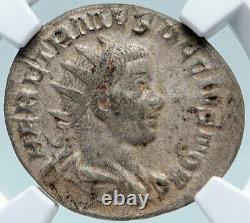
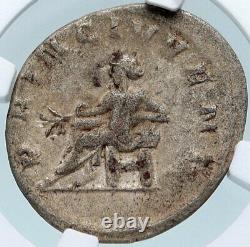
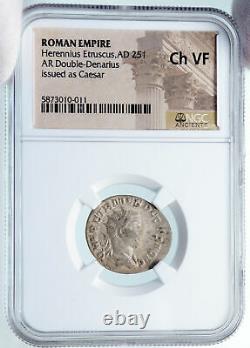
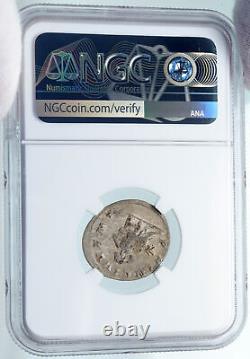
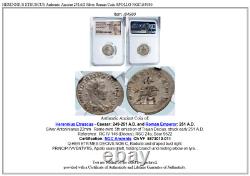


Item: i84980 Authentic Ancient Coin of. Silver Antoninianus 22mm Rome mint. 5th emission of Trajan Decius, struck early 251 A. Reference: RIC IV 146 (Decius); RSC 24a; Sear 9522 Certification: NGC Ancients. Ch VF 5873010-011 Q HER ETR MES DECIVS NOB C, Radiate and draped bust right.
PRINCIPI IVVENTVTIS, Apollo seated left, holding branch and resting elbow on lyre. In Greek and Roman mythology, Apollo, is one of the most important and diverse of the Olympian deities. The ideal of the kouros (a beardless youth), Apollo has been variously recognized as a god of light and the sun; truth and prophecy; archery; medicine and healing; music, poetry, and the arts; and more. Apollo is the son of Zeus and Leto, and has a twin sister, the chaste huntress Artemis.Apollo is known in Greek-influenced Etruscan mythology as Apulu. Apollo was worshiped in both ancient Greek and Roman religion, as well as in the modern Greco-Roman Neopaganism.
As the patron of Delphi (Pythian Apollo), Apollo was an oracular god - the prophetic deity of the Delphic Oracle. Medicine and healing were associated with Apollo, whether through the god himself or mediated through his son Asclepius, yet Apollo was also seen as a god who could bring ill-health and deadly plague as well as one who had the ability to cure. Amongst the god's custodial charges, Apollo became associated with dominion over colonists, and as the patron defender of herds and flocks. As the leader of the Muses (Apollon Musagetes) and director of their choir, Apollo functioned as the patron god of music and poetry. Hermes created the lyre for him, and the instrument became a common attribute of Apollo.
Hymns sung to Apollo were called paeans. In Hellenistic times, especially during the third century BCE, as Apollo Helios he became identified among Greeks with Helios, god of the sun, and his sister Artemis similarly equated with Selene, goddess of the moon.
In Latin texts, on the other hand, Joseph Fontenrose declared himself unable to find any conflation of Apollo with Sol among the Augustan poets of the first century, not even in the conjurations of Aeneas and Latinus in Aeneid XII (161-215). Apollo and Helios/Sol remained separate beings in literary and mythological texts until the third century CE. Herennius Etruscus Latin: Quintus Herennius Etruscus Messius Decius Augustus ; ca. 227 - June 251, was Roman emperor in 251, in a joint rule with his father Trajan Decius. Emperor Hostilian was his younger brother. Herennius was born in or near Sirmium in Pannonia (now Sremska Mitrovica, Serbia), during one of his father's military postings. His mother was Herennia Cupressenia Etruscilla, a Roman lady of an important senatorial family. Herennius was very close to his father and accompanied him in 248, as a military tribune, when Decius was appointed by Philip the Arab to deal with the revolt of Pacatianus in the Danube frontier. Decius was successful in defeating this usurper and felt confident to begin a rebellion of his own in the following year.Acclaimed emperor by his own troops, Decius marched into Italy and defeated Philip near modern Verona. In Rome, Herennius was declared heir to the throne and received the title of princeps iuventutis (prince of youth). From the beginning of Herennius' accession, Gothic tribes raided across the Danube frontier and the provinces of Moesia and Dacia. At the beginning of 251, Decius elevated Herennius to the title of Augustus making him his co-emperor. Moreover, Herennius was chosen to be one of the year's consuls.
The father and son, now joint rulers, then embarked in an expedition against king Cniva of the Goths to punish the invaders for the raids. Hostilian remained in Rome and the empress Herennia Etruscilla was named regent. Cniva and his men were returning to their lands with the booty, when the Roman army encountered them. Showing a very sophisticated military tactic, Cniva divided his army in smaller, more manageable groups and started to push back the Romans into a marshy swamp.Sometime during the first two weeks of June, both armies engaged in the battle of Abrittus. Herennius died in battle, struck by an enemy arrow. Decius survived the initial confrontation, only to be slain with the rest of the army before the end of the day. Herennius and Decius were the first two emperors to be killed by a foreign army in battle.
With the news of the death of the emperors, the army proclaimed Trebonianus Gallus emperor, but in Rome they were succeeded by Hostilian, who would die shortly afterwards in an outbreak of plague. World-renowned expert numismatist, enthusiast, author and dealer in authentic ancient Greek, ancient Roman, ancient Byzantine, world coins & more. Ilya Zlobin is an independent individual who has a passion for coin collecting, research and understanding the importance of the historical context and significance all coins and objects represent.Send me a message about this and I can update your invoice should you want this method. Getting your order to you, quickly and securely is a top priority and is taken seriously here. Great care is taken in packaging and mailing every item securely and quickly. What is a certificate of authenticity and what guarantees do you give that the item is authentic? You will be very happy with what you get with the COA; a professional presentation of the coin, with all of the relevant information and a picture of the coin you saw in the listing.
Additionally, the coin is inside it's own protective coin flip (holder), with a 2x2 inch description of the coin matching the individual number on the COA. Whether your goal is to collect or give the item as a gift, coins presented like this could be more prized and valued higher than items that were not given such care and attention to. When should I leave feedback? Please don't leave any negative feedbacks, as it happens sometimes that people rush to leave feedback before letting sufficient time for their order to arrive.
The matter of fact is that any issues can be resolved, as reputation is most important to me. My goal is to provide superior products and quality of service. How and where do I learn more about collecting ancient coins? Visit the Guide on How to Use My Store. For on an overview about using my store, with additional information and links to all other parts of my store which may include educational information on topics you are looking for.
This item is in the category "Coins & Paper Money\Coins: Ancient\Roman: Imperial (27 BC-476 AD)". The seller is "highrating_lowprice" and is located in this country: US. This item can be shipped worldwide.
- Ancient Coins: Roman Coins
- Certification Number: 5873010-011
- Certification: NGC
- Grade: Ch VF
- Year: 251 AD
- Composition: Silver
- Ruler: Herennius Etruscus
- Denomination: Antoninianus
- Era: Ancient

